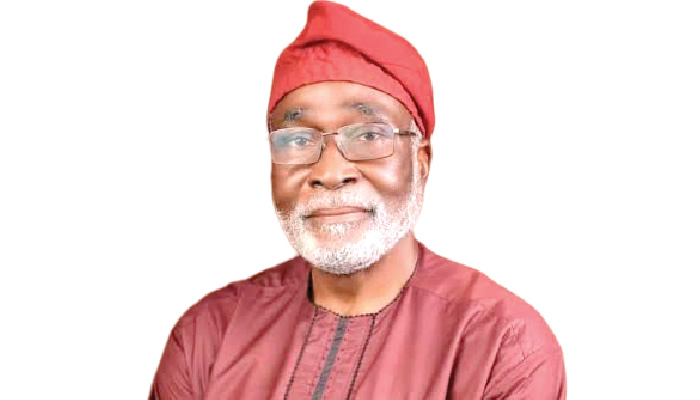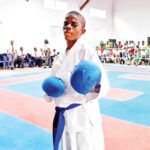
For two and a half years you served as a commissioner under President Bola Tinubu when he was the governor of Lagos State, what caused the rift between both of you?
There is no rift between us. The party was based on principles and I observed some things were not going right, and no matter the situation you found yourself it was the boss that would always decide. However, in a democracy, the idea is for people to rub minds, share ideas and be convinced with what the final position would be, but I discovered that was not the case so I decided that it was difficult for me to operate in that kind of atmosphere. That was what happened. The decision to move from Alliance for Democracy to Action Congress was not taken by the stakeholders. For me, I didn’t particularly feel safe heading for the AC in such a manner because I knew that would be the end of the principles that brought us together under the banner of AD. You know AD had a historical background from the leadership of the late sage, Chief Obafemi Awolowo, down to late Chief Lateef Jakande, Bola Ige and so on before it got to our own generation. When it was about time to move from AD to AC, I didn’t quite see the principles and why AC was going to displace AD, so I decided to stay back from that movement.
After you left, was there pressure from Tinubu or any other people from the party?
Yes, before there were colleagues and friends who said it was okay and that we could weather it but I wasn’t so comfortable with it and I wasn’t alone. A good number of us left about the same time. Along with that crisis was the fact that he wanted a successor and we had a fair playground to participate and at the end of the day he decided to anoint Babatunde Fashola as his successor and that resulted in a number of us taking a decision. Primarily, the decision was based on the initial things I said that things were not going to be well in the AC.
What is your relationship with Tinubu now?
I have regards for him being my former boss and at the same time our relationship came a long way. I was the director of the organisation for his campaign on his very first political outing as a senator and he was proud of the successes we attained together from that struggle and so did I. we also went through so many other contests and they were all very successful, so those memories are strong and I respect and appreciate most of the things we went through and the successes attained that time. We did not part ways on any negative premise. Our parting was basically on principles and so I still have a firm relationship with him.
You’ve been active in politics for more than two decades, and many people have blamed the political leaders for the rot in the country, what do you think is the root of Nigeria’s leadership problem?
I think the greatest challenge that we have is that the leadership does not in the real sense believe in democracy. The way we accepted democracy in this country was like the way we accepted religion. They said this was it and we accepted it. At the same time, those who brought religion had the cultural background that made it easier and grew in it the way they wanted it. You can imagine a situation whereby every administration comes with its policies, which is natural, but what would those policies be anchored on? It should be anchored on certain ideologies. Democracy, as we embraced it, was not something we thought of and built in a way that could reflect the true meaning of democracy. In our situation, leaders come and try to rewrite things with their format of democracy. As I said earlier, the military in handing over democracy to us believed that when we talk about democracy it is about who wins the election and as such the argument is that what is ideology when people are hungry; that a hungry person doesn’t have ideas. But that is wrong. An idea is how we want to govern ourselves. What are the possibilities? That’s when we talk about socialism, capitalism and others, as a basis to make choices. Today, everybody that comes out wants to feed hungry people, yet we continue to have people that are hungrier. Our nation is just coming around to recognise institutionalisation as a means of achieving goals rather than everything centered on individuals. It is also funny that those who try to give directions are the so-called cultural groups from the different regions. As long as we are making our choices for the wrong reasons we will continue to have governments that won’t serve us. Also, the way leaders emerge, they don’t have to sweat, campaign or tell us anything about themselves for people to know their background. All they have to do is to emerge and we start going to court to find a solution. It is not supposed to be that way.
Do you think this is mainly the cause of some of the recent coups in Africa?
Yes, it plays a major part, because the people are not being served. The people in government serve only themselves and their families, and that creates opportunity for the military, and they have been a major part of governance over the years. They are also countrymen and were told that the reason why they are military is only to protect the territorial integrity of our nations and leave politics for the politicians. But here are politicians who are not carrying the people along, so the military are going to sit back and say, what’s the difference? If these people are not being carried along, what are we sitting here for? Are we protecting the integrity of the state or we are security guards?
Your party’s presidential candidate, Atiku Abubakar, is going to the Supreme Court to challenge the verdict of the tribunal, do you think it’s necessary at this moment, because some lawyers have advised that the judgment was clear and that petitioners should let it go?
I believe it is necessary for our democracy because if he or other people that are hurt do not challenge it, that is sweeping the dirt underneath the carpet and it is not good for our democracy. If we establish principles and live by them, of course we will have respect for our laws. What we have now is a different kettle of fish entirely. I particularly believe that like Atiku indicated, the appeal is not personal. He has nothing against any individual but let us set the records straight so that the future generation could benefit from it. I listened to the judgment and I actively partook in the voting and saw everything that transpired. I don’t believe that for justice to be attained in this circumstance judgment should not provide avenues for corrections. I believe something is wrong with that notion that only the Independent National Electoral Commission is empowered to decide the results of elections. How can the election tribunal of a country decide that it is okay for INEC to do as it pleases knowing how much was invested by the nation to create the BVAS and the INEC Results Viewing portal? That judgment was like a status quo. If you look at the series of documentation presented, they said they were unacceptable because they didn’t meet certain criteria. For God’s sake, people set those criteria and you are supposed to give judgment based on the information provided, but all you could say was like don’t bother me with all these things you are bringing. The complainants were dribbled when they needed to get certain materials but they still found a way to get those things they needed. However, it was convenient for them to say it was not stamped and signed by the authority that was complicit in the first instance.
Former governor of Rivers State, Nyesom Wike, has said PDP could not punish him for supporting another party during the presidential election, has the party forgiven him and the four other governors who formed the G-5?
I believe we should first of all put in perspective what Wike meant. What he is saying variably is that he will challenge any attempt to punish him and he has that right to do so. On whether or not he should be punished, I don’t think anybody has come to that conclusion that he deserves to be punished. Yes, we saw the videos of most of the antics and from interviews, there are some of them that the party will probably look into. The party has already said we have more important things to do now and that we will attend to other matters later. We do not want any form of distraction right now, so if the public is eager to see anyone punished or any decision taken to correct an issue, it may not be as fast as expected and it may even not come at all. Atiku believes he will be President and he has good chances at Supreme Court.
Is it true that according to the party’s constitution, Wike cannot be sanctioned for working for the opposition and he has said he had the party’s permission to take the ministerial appointment, what are your thoughts on this?
There is a part of the constitution that says if you engage in any form of anti-party, you will be sanctioned. The constitution will be seriously looked into and it is left for the party to take a decision at the appropriate time. Well, the party has not really addressed that issue (whether or not he got permission to take the ministerial job) and even other things he said, so you cannot know whether it is true or not and I cannot sit here and tell you what is true and untrue. All I can tell you now is that I have not read it anywhere that the party took a decision either way, whether he should take or not take.
Some party members believe that no party loyalist would work against their party and that it could only be for selfish reasons, what do you think?
My view is that people have different characters. However, to me, what Wike seems to be saying is that you have not told us not to take it (the appointment) and we have seen situations like this before. If you don’t manage it well, it could create a crisis and do more harm than good, even to the party. When the late General Sani Abacha gave Lateef Jakande an appointment, he took it and the rest of the team said he shouldn’t have taken it. When Chief Olusegun Obasanjo gave the late Chief Bola Ige an appointment as a minister, some said he took it without the consent of the party and that he probably spoke with some individuals who were his friends in the party. The party must be able to see things in accordance with the constitution. As a matter of fact, Chief Bola Ige was planning to run on the party’s platform before his demise, so there are certain things that would happen and the party would handle in certain ways. Only those who are involved will understand why those decisions were taken.
Wike has asked that Atiku and Senator Aminu Tambuwal and some others be suspended, what do you make of that?
He doesn’t have the capacity to suspend anybody, he is still angry and venting his anger at people he probably thought were responsible for the situation the party found itself in. He is just like Donald Trump who would say, see I don’t have to be politically right, I will do what I want to do.
Despite being a party member, Wike says the PEPC’s verdict that dismissed Atiku’s petition was profound, do you see the ruling as such?
He is trying to defend his corridor. I mean he will do everything to say we were right, they were wrong, so they won’t see all these loopholes that some of us are seeing after doing a critical analysis of what transpired. We listened the whole day and they were saying we were not accepting this because it was a pre-election matter. For God’s sake, how do you deliver justice when you have rubbished all that have been presented to you? If justice is delivered like this, that means we are talking about tradition. If our judiciary is not accommodating in a progressive way, it will be stagnant. It will be in a way of status quo and we will not move.
After the judgment of the PEPC, many have called for judicial and electoral reforms, what kind of reforms do you think are necessary?
All these reforms don’t work. Who are the people doing the reforms? Is it not the same senior lawyers that you pack there to do it? It doesn’t work. Why can’t the process reform itself as it moves on? They are now telling us that once INEC concludes an election, nobody can tamper with it. That was the ruling we got. Is that a fair ruling? We all watched the collation and by the second day, the result was not on the IReV portal, but the court said it is not compulsory and it set it aside. The judiciary should remove itself from that role. It should only decide if this election was properly done or not. Did we not have the emergency Electoral Act (2022) and what role did it play in all of these? For me, their act was a blatant disregard for the people.
As your former boss, do you see Tinubu as someone who has the capacity to deliver his campaign promises?
I must be frank with you, unless I missed something that he published. He didn’t do more of open campaigns and I’m not on the platforms that he used for those campaigns. I’m not aware of many of the promises that he made, so I can’t speak to whether he can deliver those things or not.
Do you hope to run for any political office in the future?
We hope to have a few more years longer. If you beat your body too hard, that is why you will see instances where people return from meetings, sleep and don’t wake up the following day. We have heard many such stories. When you overuse your body, it has implications. When I was in my 60s I made a choice and I would like to live long enough to tell the stories and be useful for the next generation of politicians. If I remain active in politics, that is the achievement I desire, not to contest elections. I will take responsibilities that I can handle to benefit my party, with a lot of experience.





